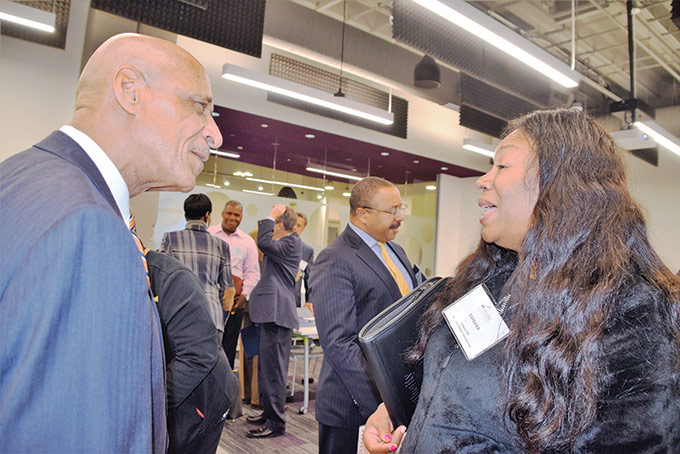
The long-awaited Pennsylvania disparity study has been released.
Kerry Kirkland, Deputy Secretary of Diversity, Inclusion & Small Business Opportunities for the state of Pennsylvania, had mentioned during a speech in Pittsburgh that a disparity study was on the way. The objective of the study is to provide information to assist the Department of General Services (DGS) implement the Commonwealth’s Small Diverse Business Program.
On Nov. 1, Kirkland returned to Pittsburgh, announcing that the study, completed a day prior, confirms that the state of Pennsylvania has “a lot of work to do” to even the playing field for small businesses.
The study included analyses of the participation of minority-, women-, disabled-, veteran-, and lesbian gay bisexual and transgender-owned businesses in prime contracts and subcontracts that the DGS awarded during the period of July 1, 2011 through June 30, 2016.
“This is a good time for small businesses in the Commonwealth,” stated Kirkland. “Because of the environment Gov. Wolf has set with all secretaries and deputy secretaries in the state. His leadership and commitment since he has been in office is setting the tone for change. I am glad that he has the courage to address the issue that discrimination exists in the marketplace.”

The study, completed by BBC Research and Consulting, located in Denver, examined quantitative and qualitative information related to: the legal framework surrounding the DGS’s implementation of the SDB Program; local marketplace conditions for different groups of SDBs; and contracting practices and business assistance programs that the DGS currently has in place.
According to the executive summary, BBC summarized key information from the study in five parts which included analyses in the disparity study, availability analysis results, utilization analysis results, disparity analysis results, and program implementation.
The final chapter of the study, program implementation, addressed and had recommendations for 15 issues: Consolidation of Programs, SDB Participation, Statutory Authorization of DGS Programs, Overall Annual Aspirational Goal, Subcontract Opportunities, Subcontracting Goals, Certification, Unbundling Large Contracts, Bidding Procedures, Prime Contract Opportunities, Prompt Payment Policies, Contract Management, Growth Monitoring, Subcontract Data, and Networking and Outreach.

The Business Development and Outreach recommendation of the study suggests that the DGS considers continuing and expanding efforts to grow and support small businesses throughout the Commonwealth. It stated that the DGS and other entities throughout Pennsylvania currently operate numerous programs that provide technical assistance, mentoring and networking opportunities for entrepreneurs. But data from other components of the study indicates that there are still substantial disparities in business ownership for women, minorities and other diverse individuals. It stated that based on those results, the DGS should consider expanding and improving its business development programming, and networking and outreach events in order to further catalyze small business formation and success.
It was also recommended that the DGS hosts and participates in many networking and outreach events that include information about marketing, becoming certified in the Commonwealth, doing business with the Commonwealth, and available bid opportunities. The DGS should consider continuing those efforts but might also consider broadening its efforts to include more partnerships with local trade organizations and other public agencies. The DGS might also consider creating a consortium of local organizations and public agencies that would jointly host quarterly outreach and networking events and training sessions for businesses seeking public sector contracts. In addition, the DGS should consider ways that it can better leverage technology to network more effectively with businesses throughout the Commonwealth. The DGS could consider making use of online procurement fairs, webinars, conference calls, and other tools to provide outreach and technical assistance.
“Get the study and read it,” Kirkland advised. “Now is the time for change because our communities are changing. We want to have one of the best diversity programs in the country, but we all have to work together, we can do it, but we must remain steadfast.” The study can be found on the DGS website at www.dgs.pa.gov.
Kirkland was in Pittsburgh participating in the Governmental Committee’s “Leadership Sets the Tone” Closing the Disparity: Action, Access, and Accountability event. The Governmental Committee, stated Juan Garrett of the Riverside Center for Innovation, is working to become an advocate for small businesses within the region. “We are striving to work with our elected officials to assist us in putting strategies in place to assist MBE firms overcome some of the existing barriers and hurtles that they go through to get government contracts. Who better to help craft a policy than the procurement officers that work in the space every day.”
He also pointed out that help is needed from the small business owners to make sure that they are qualified and certified to know their capabilities and to stay focused on the work they do and not venture in other areas. “Be the best that you can be at what you do to be assured to get the contracts that are available to you.”
Diamonte Walker of the Urban Redevelopment Authority and Governmental Committee member reflected on the Governmental Committee’s “Leadership Sets the Tone” philosophy and refreshed the audience’s memory of the pledge that was enacted during the group’s March conference. She mentioned that the Committee’s vision to improve the equity development landscape in the region was a factor. “As a body we agreed that the work we do as procurement and compliance officers and business development practitioners in this space, that it does not mean a lot if the leaders of the organizations and those governing our region don’t set a serious tone around what it means to be equitable and inclusive,” she explained.
The mission of the Governmental Committee is to create effective methods that strengthen economic opportunities for MWDBEs and to provide assistance-enabling contractors and businesses to secure contracts in the goods and service, construction and professional services markets leading to profitability and growth for the businesses.
The Committee’s 18th annual conference is set for March 7, 2019 at Rivers Casino.
Like us at https://www.facebook.com/pages/New-Pittsburgh-Courier/143866755628836?ref=hl
Follow @NewPghCourier on Twitter https://twitter.com/NewPghCourier